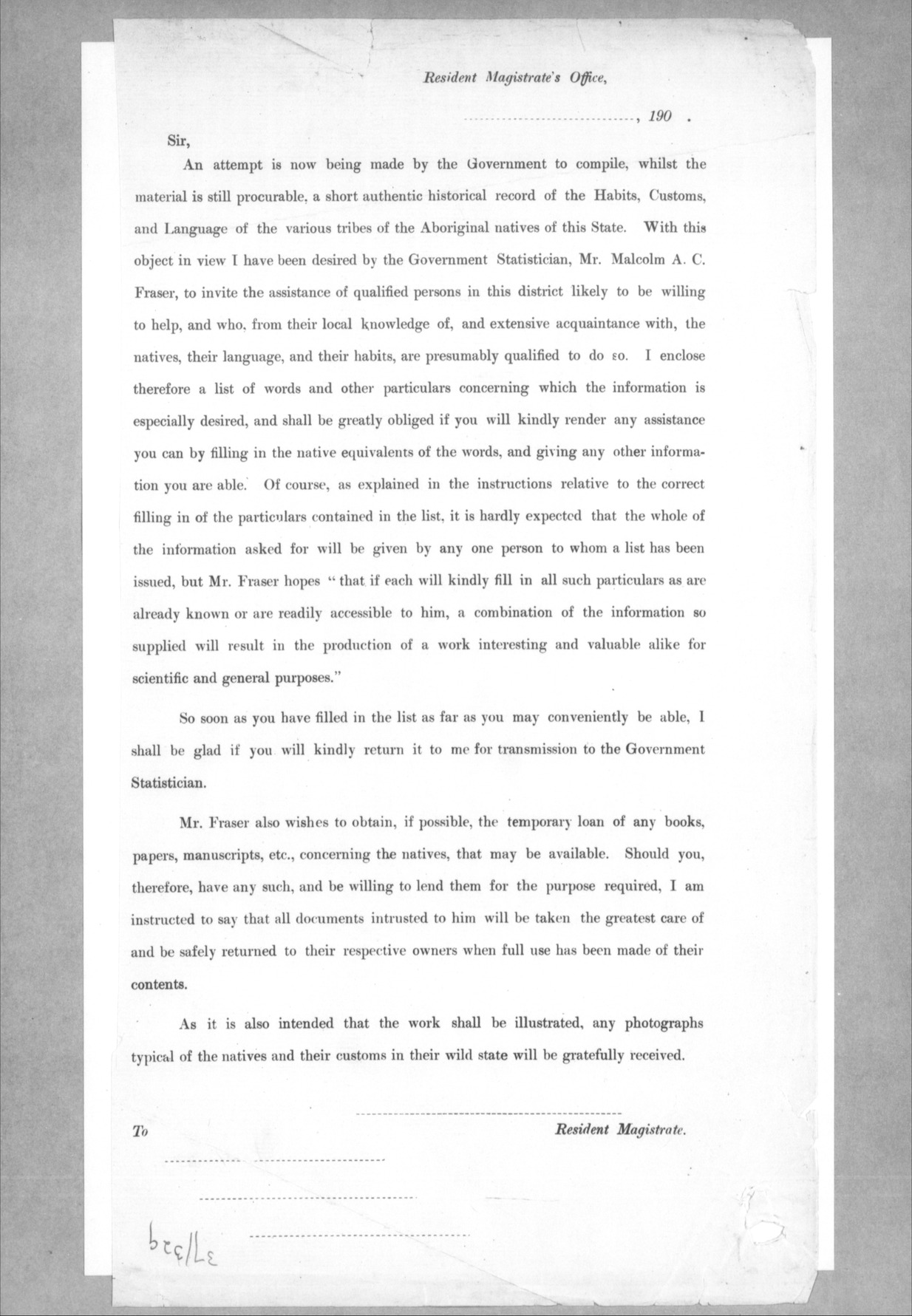Digital Daisy Bates - the questionnaire
This questionnaire was devised by Bates and sent out by the Government Statistician, Malcolm Fraser, in 1904. It was filled in by various people by hand, creating a set of manuscript pages. Bates then supervised the typing of these manuscripts and the typed versions you see here are a copy of those typescripts. Of the 500 copies of the questionnaire that were printed and distributed to magistrates, pastoralists and the police force eventually some 120 were completed and returned. When the responses to the questionnaire came in they were 'of mixed quality and often unreliable as to the original location of the Aboriginal people questioned' (Reece 2007:48). Some were filled in by Bates from earlier sources, for example item 39-216 is 'Compiled from vocabularies by Richard Helms (Fraser Range, Esperance, Hampton Plains, Knutsford); A. Wells (Fraser Range); W. Williams (Eucla and Eyre's Sandpatch); Campbell Taylor (Doubtful Bay, Israelite Bay)'. Another list (43-095) was filled out from sources by 'Police Constable Hackett, Bishop Salvado, H. J. Monger, E. K. Parker, G. Whitfield'. It would be useful to be able to identify which words came from which source in these cases, and, where multiple questionnaires were combined into one typescript, that will be possible in the next stage of our project.
Sir
An attempt is now being made by the Government to compile, whilst the material is still procurable, a short authentic historical record of the Habits, Customs, and Language of the various tribes of the Aboriginal natives of this State. With this object in view I have been desired by the Government Statistician, Mr. Malcolm A. C. Fraser, to invite the assistance of qualified persons in this district likely to be willing to help, and who from their local knowledge of, and extensive acquaintance with, the natives, their language, and their habits, are presumably qualified to do so. I enclose therefore a list of words and other particulars concerning which the information is especially desired, and shall be greatly obliged if you will kindly render any assistance you can by filling in the native equivalents of the words, and giving any other information you are able. Of course, as explained in the instructions relative to the correct filling in of the particulars contained in the list, it is hardly expected that the whole of the information asked for will be given by any one person to whom a list has been issued, but Mr. Fraser hopes "that if each will kindly fill in all such particulars as are already known or are readily accessible to him, a combination of the information so supplied will result in the production of a work interesting and valuable alike for scientific and general purposes."
So soon as you have filled in the list as far as you may conveniently be able, I shall be glad if you will kindly return it to me for transmission to the Government Statistician.
Mr. Fraser also wishes to obtain, if possible, the temporary loan of any books, papers, manuscripts, etc., concerning the natives, that may be available. Should you, therefore, have any such, and be willing to lend them for the purpose required, I am instructed to say that all documents intrusted to him will be taken the greatest care of and be safely returned to their respective owners when full use has been made of their contents.
As it is also intended that the work shall be illustrated, any photographs typical of the natives and their customs in their wild state will be gratefully received.

References
Reece, Bob. 2007. Daisy Bates: Grand dame of the desert. Canberra: National Library of Australia.
The project has been part of Nick Thieberger's ARC Future Fellowship (FT140100214). Contact him for any queries about the Digital Bates project.
This project has also been supported by: the Faculty of Arts, University of Melbourne; the Australian Research Council; the ARC Centre of Excellence for the Dynamics of Language.

This work is licensed under a Creative Commons Attribution-NonCommercial 4.0 International License.
The moral rights of the speakers are asserted





